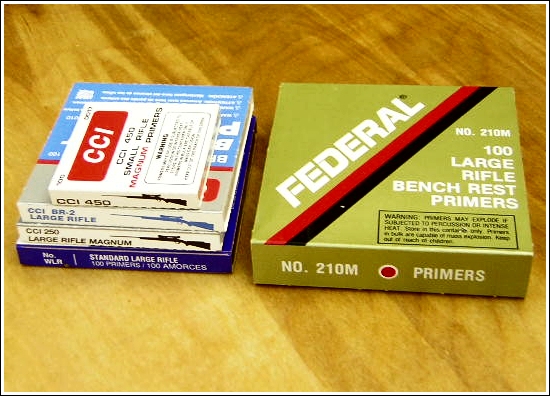What's the best primer?

Quite often I find shooters looking for a quick answer to
determine which primer is the best for their handloads. Most
primers look pretty much the same, and there are many different brands
to choose from. Obviously, with rifles your first decision is
either a Small Rifle (SR) or a Large Rifle (LR) primer.
After that, you can spend
a great deal of time experimenting with different brands, and you'll
almost always find the "best" primer for your handloads - eventually.
However, why work so hard trying to reinvent the wheel? I
finally discovered that there's usually a better way to get started.
Just see what most of the top competition shooters are using
with similar handloads. (This is only valid if they're using a
very similar type of ammo.) Even though most competition
shooters seem to use the same brand of primers, they are devoted to
extensive experimentation to discover the best components for their
particular handloads. Believe me, you'll be hard pressed to find
better reloading components than they use.
Magnum primers - They're for magnum calibers, right? Well . . . .
mostly, but they're not just for magnum calibers. Sometimes a
non-magnum primer can help you get better accuracy with a magnum
caliber. Magnum primers are a big advantage when trying to
ignite a large volume of powder, or when you're using a slow burning
powder that's difficult to ignite. There are a number of
situations that benefit from a hotter ignition than regular primers.
One day while shooting in a snow covered field, it was easy to
see a considerable amount of unburned powder granules that were blown
out the barrel. I was using standard primers to ignite a slow
burning powder in a 300 Weatherby Magnum (not a good idea, but it was
all I had). Reloading manuals will usually direct you to use a
magnum primer when it's needed.
Benchrest primers - They're for benchrest shooting, right? Well . . . .
mostly, but they're not just for benchrest shooting. In most
cases, benchrest primers are quite a bit more expensive than standard
primers, because they're individually inspected for even the slightest
defects. Regular primers are not individually eyeballed for
quality. Varmint hunters and extreme long range shooters usually
prefer benchrest primers, because they know there will be no accuracy
problems related to primers. On the other hand, most hunting
rifles would not notice the slightest advantage, and the extra cost
could make benchrest primers a waste of money.
You can select the best primer for your
needs, if you know the unique characteristics of each different brand.
However, your search for the best primer can also be affected by
the particular "type of firearm" you're using. The first time I
entered Practical Pistol Competition (PPC), I fired 150 rounds and had
three rounds that failed to fire. I was using a fine tuned
double action revolver (with a lightened hammer spring) for the first
time. It was a great advantage - but only if all of your rounds
fire! The more experienced shooters knew the cause of my
misfires, because they've seen it happen many times when shooters first
enter PPC competition. That's when I discovered that some brands
of primers are made with cups that are quite different in hardness.
I had been using CCI primers (known to have the hardest cup of
any brand). Since then, I use Federal primers (the softest cup)
for most of my handgun loads, and I use CCI primers for 30-30 loads
whenever using a tubular magazine.
Keep in mind that finding the best primer for your
handloads is a very small part of your search for improved accuracy.
So . . . . what's the best brand of primer? As far as I
can find, nothing useful has ever been documented to describe the
unique charactoristics of each different brand of primers. The
very best primer for your rifle needs to be determined by individual
experimentation and taking meaningful notes. My advice is to
take advantage of what competition shooters have learned, and start
with the brands that they use. Try their
primer as your benchmark for testing, then experiment with different brands. Try to improve the accuracy level that competition
shooters get . . . . if you can.
